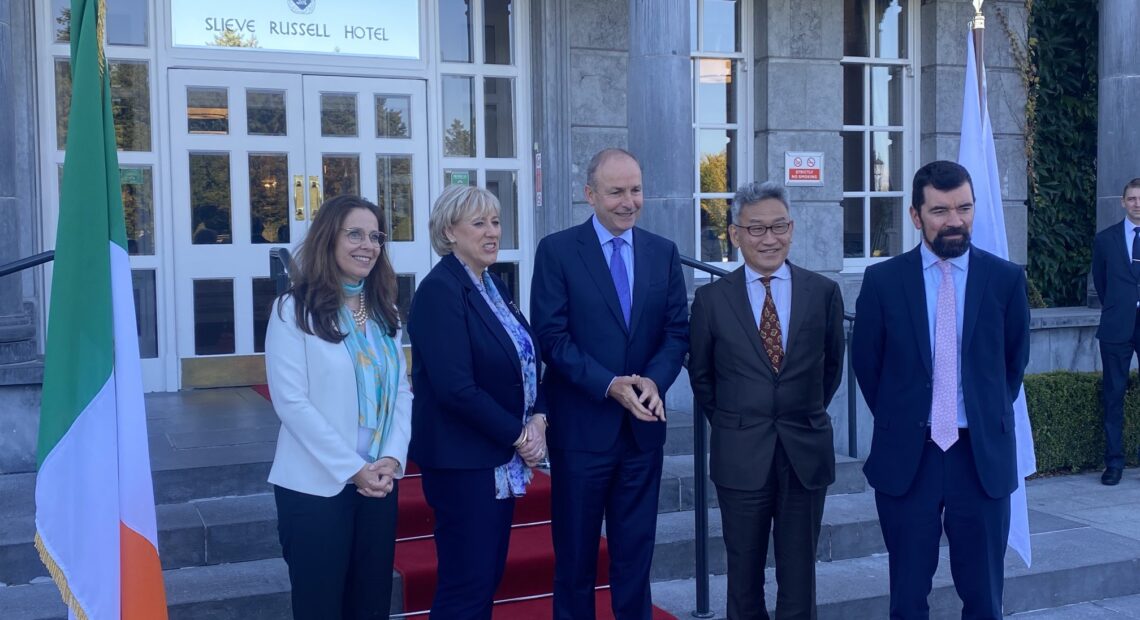The 13th OECD Rural Development Conference has concluded with the delivery of the Cavan-OECD Roadmap on Strengthening Rural Resilience against Global Challenges.
The 2-day Conference was hosted by the Government of Ireland and convened around 500 delegates from 30 OECD countries, including Government ministers, senior policy makers and stakeholders in the rural sector.
Centred on the objective of “building sustainable, resilient and thriving rural places” the Roadmap highlights the huge potential of rural areas in renewable energy, the digital economy, and in deploying new technologies as they seek to respond to global shifts and shocks.
Making the key note address to the Conference, Taoiseach, Micheál Martin said, “as a founding member in 1961, Ireland’s role in the story of the OECD is a reflection of our early and lasting commitment to multilateralism and to overcoming common and global challenges as a community of nations. The OECD’s standing as a globally open and evidence driven forum, which engages from national to local levels of Government, is more vital than ever as we confront increasing challenges to the international rules-based system. It is important that the OECD remains an open and globally relevant organisation, and Ireland welcomes the recent decision to commence accession discussions with five countries in Europe and Latin America.”
“Working together will be fundamental to overcoming the many global challenges we are facing. The Cavan-OECD Roadmap that you will be launching today is a unique opportunity to shape, in a very real way, the work programme of the OECD on rural development. Its drive to support countries to tackle today’s challenging environment is an important piece of work and will directly support the efforts of all member states. The discussions that have already taken place at this conference demonstrate the depth of ambition, enthusiasm and pride that we all hold for our rural areas. It highlights what can be achieved through, and for, rural communities to deliver a more sustainable society, economy, environment and a brighter future for us all.”
OECD Deputy Secretary-General Yoshiki Takeuchi said, “as we leave Cavan with this Roadmap for rural areas, we must remember that this is a road we must walk together – with the residents of rural communities. The current shocks present us all with opportunities and the OECD will continue to work with governments at all levels to put in place the right policies to enable rural areas to thrive. The Roadmap will help us prioritise policies that improve physical and digital accessibility, rural innovation, digital and lifelong learning skill, and quality public services to support diversification, resilience, and well-being.”
Minister for Rural and Community Development, Heather Humphreys said, “I am delighted to see that despite the diversity of experiences across the OECD region, we have a huge amount in common. There is a clear commitment across all the OECD member states to work collectively to respond to the challenges faced and to exploit the opportunities presenting in a changed world. There is strength in our diversity. Our discussions have also reaffirmed the vital role rural communities have in building a sustainable and inclusive future. This underscores the need for Government to support communities to become resilient so we can face the challenges together and build on the opportunities. Importantly, we must work with all communities, including those living in remote, peripheral or island areas, indigenous or minority groups or other vulnerable populations. We can’t afford to leave anyone behind.”
The Roadmap identifies a number of action points to:
- Unlock innovation-based opportunities in rural areas.
- Leverage the green transition in rural areas.
- Seize the opportunities of digitalisation.
- Tackle the energy crisis and boosting the resilience of rural regions.
- Adapt rural areas to demographic change.
- Promote inclusion in rural areas.
The Roadmap also lists 6 cross-cutting action points to help policy makers implement better rural policies for better lives.













